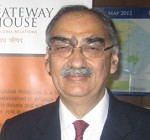The year 2014 is critical for Afghanistan and the South Asian region, with the impending withdrawal of the U.S.-led military forces and its potential impact on regional security. The worry for India, especially, is the possible return to power of the Taliban in Kabul, and its likely impetus to anti-India groups in Pakistan. Gateway House’s Shai Venkatraman interviews Vivek Katju, former Indian Ambassador to Afghanistan, about the implications of the changes in Afghanistan and the likely scenarios in the Afghan presidential election later this year.
Q. In your view, how have the fractures in U.S.-Pak relations affected the foreign policies of the two countries vis-à-vis India?
Both the U.S. and Pakistan pursued separate objectives while they proceeded with their bilateral relations. The U.S., all through, right from 1947, did not have common objectives with Pakistan, as far as South Asia was concerned.
The Pakistanis made it very clear from the beginning that they wanted U.S. assistance, primarily military, to meet what they conceived of as the Indian threat. The U.S. has, at different times over the last six decades and more, tried to satisfy this desire, not wholly but substantially. At times, when the U.S. need for Pakistan was limited, its propensity to cater to demands vis-a-vis India diminished. I think the ebb and flow of the U.S. need for Pakistan impacted India-Pakistan.
Q. How do you assess India’s current policy towards Afghanistan? The government of Afghanistan, led by President Hamid Karzai, is demanding greater military aid from India. What is your opinion on this?
I think our relationship with Afghanistan should be direct and not through the prism of our relationship with any other country. And if the Afghans feel that they need assistance in the security sector, we should be willing to give it.
Q. What are the likely scenarios in the Afghan presidential election, scheduled for April 2014? In what ways will the election impact India?
President Karzai has said that he is going to leave, and under the Constitution he has to leave. But a doubt still lingers in many minds whether he will actually do so or whether he will, as I have said in one of my articles, play one last card. Should the elections go ahead, the likely scenario will depend on who becomes president. I am confident that whoever does, the Afghan-India relationship will remain strong.
Q. There is a view among some people that in its efforts to secure an exit from Afghanistan, the U.S. is willing to accommodate Pakistan’s interests on Afghanistan. Is this a valid view?
There is great merit in it, which is already being demonstrated. The U.S. has realised that without Pakistan’s support, things can get messy. The extent to which it is willing to cater to Pakistan’s demands for a say in the internal affairs of Afghanistan, is questionable. But over the last year and more, they have accepted many of those demands.
Q. Afghanistan’s neighbours, primarily in Central Asia, have a lot at stake – including the spill-over of terrorism and issues of drug trafficking. These problems will increase if the Taliban comes to power. But these countries have not taken substantial measures to counter the potential problems by reintegrating Afghanistan, especially its economy, into the region. How do you look at this issue?
It is premature to make such attempts. India has tried. We have a Preferential Trade Agreement with Afghanistan. But Pakistan has created problems. It does not give us access. It allows Afghans to use the land route into Punjab, but not India. The situation is such that the ideal of Afghanistan becoming a bridge between Central Asia and South Asia, which will permit the flow of people, trade and investments, will have to wait. However, our commercial and economic engagement with Afghanistan in terms of assistance must continue
Vivek Katju has served as India’s Ambassador to Afghanistan, Myanmar and Thailand. He was one of India’s chief negotiators during the hijack of Indian Airlines flight 184 in 1999 at Kandahar in Afghanistan, when he headed the Pakistan-Afghanistan-Iran desk at the MEA.
This interview was exclusively conducted for Gateway House: Indian Council on Global Relations. You can read more exclusive content here.
For interview requests with the author, or for permission to republish, please contact outreach@gatewayhouse.in.
© Copyright 2014 Gateway House: Indian Council on Global Relations. All rights reserved. Any unauthorized copying or reproduction is strictly prohibited.


